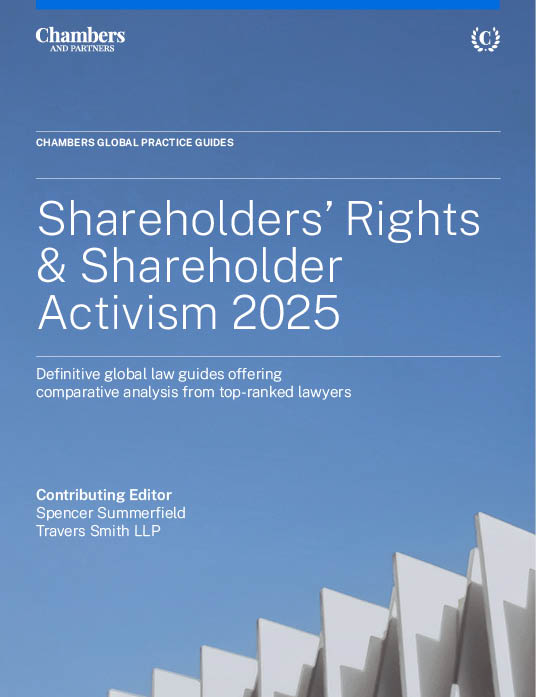
Shareholders’ Rights & Shareholder Activism 2025
The 2025 Shareholders’ Rights and Shareholder Activism guide features close to 20 jurisdictions. The guide provides the latest legal information on voting requirements and the proposal of resolutions, shareholders’ rights to appoint/remove/challenge directors and in the event of liquidation/insolvency, shareholder activist strategies, and remedies available to shareholders against the company and directors.
Last Updated: September 23, 2025
Compare law and practice by selecting locations and topic(s)
Select Locations

Select Topic(s)

Please select at least one location and one topic to use the compare functionality.
Shareholders’ Rights and Shareholder Activism 2025: A Global Overview
Shareholder activism – whereby shareholders seek to exercise their rights to exert influence on a company or its management with the purpose of instigating change – remains a fixture of global capital markets. In recent years, activists have increasingly positioned themselves as champions of shareholder value, holding management and boards accountable for their performance. Investors are demanding higher standards of directors and are quick to act where those demands are not met. Activist shareholders continue to be vocal on a broad range of topics ranging from board composition and M&A to environmental, social and governance concerns and executive remuneration. Although some companies are more likely than others to be targets, it has become increasingly evident that no company is immune from the threat posed by an activist campaign.
Levels of activism, sectoral focus and scale of targets
In the first half of 2025, activism levels decreased by 12% compared to the record highs observed in the first half of 2024, but the figures align closely with the average of the previous nine years. Activists have diversified their efforts across sectors, with industrials, technology and healthcare witnessing the most pronounced concentrations, collectively accounting for 61% of activity in the first half of the year and significantly exceeding previous yearly averages.
Departing from last year’s focus on mega-cap companies, the current period has seen a shift towards firms valued under USD5 billion.
As regards the geographical spread of shareholder activism, the USA, Japan and the UK emerged as the busiest, together representing 82% of campaigns in the first half of the year, while Europe experienced below-average levels of activity.
Nature of activist demands
Campaigns seeking changes in board composition, M&A activity, or strategic or operational overhauls have remained among the most popular avenues of shareholder activism. Notably, the number of activists targeting board seats, as well as the corresponding seats won, has increased: this is reflected in a 16% year-on-year rise in successful outcomes. Prominent activist investors such as Starboard, JANA and Elliott have been particularly effective in proxy contests. Meanwhile, demands for M&A transactions have declined in the first half of 2025, partly due to broader economic and geopolitical caution. In this more subdued M&A environment, activists have shifted their focus towards advocating for strategic and operational restructuring at target companies. Among M&A-related initiatives, calls for the outright sale of companies were the most frequent, appearing in 12% of campaigns and affecting companies such as Lyft and Unifirst. An equivalent proportion of shareholders pursued break-up strategies, evidenced in campaigns involving companies such as Becton Dickinson and SSE.
Remuneration
Shareholder revolts over director and executive remuneration continue to be a recurring concern. Although executive compensation is rarely the sole driver of activism, it increasingly serves as a tool for highlighting broader management shortcomings and governance issues. Activists often present excessive compensation packages as indicative of misaligned interests between management and shareholders. For instance, in 2024, Elliott Investment Management secured five board seats at Southwest Airlines after amassing an 11% stake and calling for changes, criticising the substantial compensation paid to management despite a significant fall in shareholder value. Similarly, during a high-profile contest with Illumina in 2025, Carl Icahn’s campaign succeeded in electing a board member and precipitated the CEO’s resignation, with Icahn emphasising that the CEO’s compensation had risen significantly despite the company’s stock value declining.
ESG Campaigns
The escalating climate crisis has propelled issues to the forefront of institutional investors’ agendas. Increasingly, these investors view the effective management of ESG risks and opportunities as fundamental to long-term value creation, integrating such factors into their investment decisions. Consequently, poor ESG performance is now a key criterion for identifying companies as potential targets for activist shareholders.
In recent years, the UK has witnessed its first instances of campaigns aimed at holding directors personally accountable for climate change. In 2023, NGO ClientEarth instituted a derivative action against the individual directors of Shell plc, alleging their failure to mitigate climate change-related risks. Although significant legal hurdles diminish the likelihood of success, such initiatives – the threat, issuance, and pursuit of permission to continue these claims – serve as tactical tools for well-funded activists to disrupt or influence board strategy and decision-making, while also garnering public attention for their activist investors' causes. Notably, the primary objective behind many climate-related claims may not be to secure a conventional legal victory but rather to spotlight practices that contribute to climate change, with litigation serving as one of several available instruments.
Anti-ESG Movement
The anti-ESG movement continues to gain traction, presenting new challenges for boards that must meticulously balance shareholder value considerations with ESG-related decisions. Recent examples include financial activism with an anti-ESG core objective. One such case involves Strive Asset Management, an outspoken investor that has recently spearheaded a campaign aimed at decoupling CEO compensation from ESG and DEI metrics.
“Vote No” Campaigns
The first half of the year has also seen a resurgence of traditional economic activism characterised by “vote no” or “withhold” campaigns. In these instances, activists encourage other shareholders to oppose one or more incumbent directors without nominating alternative candidates, differentiating these efforts from full-scale proxy contests. This approach highlights a tactical shift as activists seek to exert influence through simple yet impactful voting strategies.
Activism in Listed Investment Trusts
A notable development during the past year has been the emergence of activist campaigns targeting the UK’s investment trust sector. The New York-based hedge fund Saba Capital initially targeted seven UK investment trusts in December 2024, having built up stakes ranging from 19% to 29%. Saba called on shareholders to replace the trusts’ directors with its own nominees and, in some cases, to substitute the investment manager altogether, citing underperformance relative to benchmarks, which had resulted in trading discounts to net asset value. Although none of Saba’s proposals succeeded in securing sufficient investor support for board representation at any of the targeted trusts, the campaign serves as a wake-up call for this sector.
Comment
Despite a decrease in the overall number of shareholder activist campaigns in 2025, companies should remain vigilant. It is imperative for management and their advisers to be well informed regarding shareholder rights and expectations and to proactively develop strategies for addressing potential activist campaigns. Companies are encouraged to invest in board and management training to prepare for and pre-empt such campaigns. Conducting an audit of potential vulnerabilities may enable a company to address issues on its own terms before they are raised by activists. Maintaining continuous dialogue with shareholders and formulating an initial response plan are also essential. Additional tools and strategies are detailed in the country-specific Law and Practice section of this guide.
Global trends clearly indicate that activist interventions are no longer confined to niche or emerging issues but now influence major strategic decisions. For investors, a thorough understanding of the legal and commercial options available remains critical to achieving their strategic objectives in increasingly sophisticated markets.
